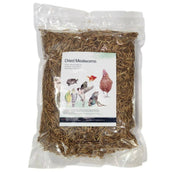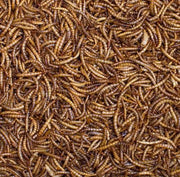Dried Mealworms (EP)
Dried Mealworms are a nutritious treat for Amphibians, Wrens, Chickens, Cichlids, Frogs, Oscars, Rats, Reptiles, Sugar Gliders, Turtles, and Wild Birds! Having trouble getting your spoiled birds to eat the dried mealworms? Try adding a dash of cold press extra virgin olive so that the dried mealworms look "life-like" to the birds! The cold-pressed olive oil is tasteless, has lots of anti-oxidants, plus amino acids, & never goes bad. Dried mealworms store well and require no special treatment. No refrigeration needed.
Typical Analysis: Protein - 53%. Fat - 25%. Fibre - 6%.
Packaging: All worms come in re-sealable clear bags.
Size Guide:
| Pack Weight | Approximate Worms Per Pack |
| 200 grams | 5000 worms |
| 500 grams | 12,500 worms |
| 1 kg | 25,000 worms |
Feeding dried mealworms to chickens and other animals is a common practice due to their high protein content and nutritional value. Here’s some detailed information about it:
Nutritional Benefits:
Protein-Rich: Dried mealworms are an excellent source of protein, making them a great option for growing chickens, laying hens, and other animals like reptiles or birds.
Fat and Calories: They are also high in fat, which is essential for animals that need to gain weight or boost their energy levels.
Vitamins and Minerals: Mealworms provide some important vitamins (like B vitamins) and minerals (such as iron and phosphorus), supporting overall health.
Feeding Mealworms to Chickens:
Great for Treats: Mealworms are often used as an occasional treat for chickens, rather than a staple food. They can be tossed into their coop or run, offering mental stimulation and entertainment.
Protein Supplement: For laying hens, dried mealworms can help supplement their diet, especially during molting or cold weather when they may need extra protein for feather regrowth and maintaining energy.
Moderation: It's important not to overfeed them as a high-fat diet can lead to obesity. A few mealworms as a treat or added to their regular feed should be enough.
Other Animals:
Reptiles: Many reptiles, including lizards, geckos, and amphibians, love dried mealworms. They are often a good snack due to their high protein and fat content, especially for insect-eating species.
Birds: Wild birds, especially those that feed on insects, will readily eat dried mealworms. They provide an excellent supplemental food source during the colder months when insects are less abundant.
Fish: Some species of fish, like goldfish, will also eat dried mealworms. However, they should be fed sparingly as it can be quite rich for them.
Pros and Cons:
Pros:
Convenience: Dried mealworms are easy to store and handle compared to live insects.
Long Shelf Life: They don’t spoil quickly, making them a long-lasting option for feeding.
Versatility: Can be fed to many different types of animals, both domestic and wild.
Cons:
High in Fat: They can be quite fatty, so moderation is key, especially for animals that are prone to obesity.
Cost: Dried mealworms can be more expensive than some other feed options, especially if used frequently.
How to Feed:
Chickens: Scatter them in the bedding or toss them on the ground so chickens can forage for them. You can also mix them into their regular feed for extra nutrition.
Other Animals: For reptiles, birds, or small mammals, you can offer them directly in a bowl, or scatter them in their habitat to mimic foraging behavior.
Final Thoughts:
Dried mealworms are a nutritious and easily accessible food option for a wide variety of animals, but like any treat, they should be given in moderation. The key is to balance them with the animals' regular diet to ensure they get all the nutrients they need without overloading on fats.


